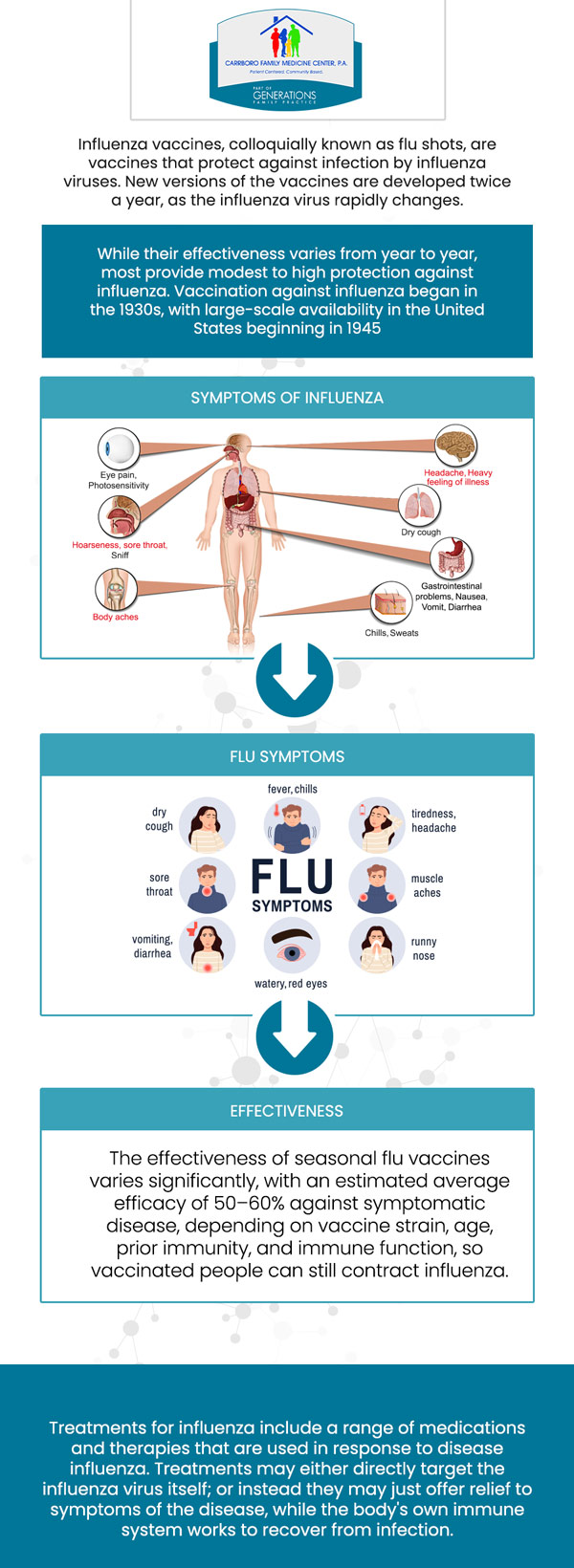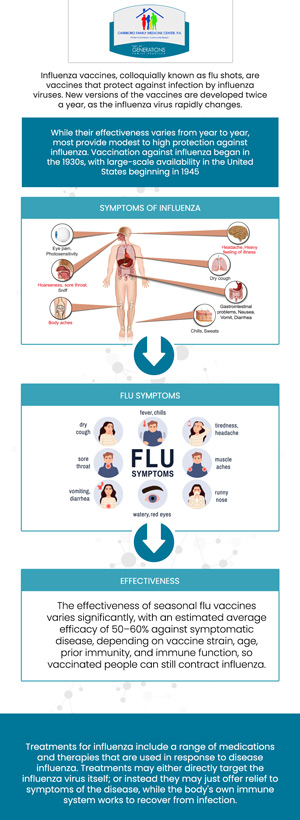How to Recognize Flu Symptoms Early
If you are experiencing symptoms such as fever, cough, sore throat, or body aches, it’s essential to seek medical attention as soon as possible. At Carrboro Family Medicine Center, Dr. Yulia Neyman, along with our team of healthcare professionals, will help you recognize and manage flu symptoms early to prevent complications. Our team provides timely care to ensure a speedy recovery and prevent the spread of the flu. For more information or to schedule a consultation, contact us or book an appointment online. We are conveniently located at 610 Jones Ferry Rd Suite 102, Carrboro, NC 27510.


Table of Contents:
What are the first signs of the flu?
How can I tell if I have the flu or a common cold?
Can flu symptoms appear without a fever?
How quickly do flu symptoms develop?
Is it possible to have the flu without a cough?
The earliest signs of the flu often come on suddenly and may feel more intense than other common viral illnesses. Many individuals report an abrupt wave of fatigue or body aches, followed by chills or the sensation of coming down with something before any outward symptoms even begin. A sore throat may develop early, sometimes accompanied by a headache, stiffness, or even a general sense of heaviness that affects energy levels and mobility. Within a short period, other symptoms may begin to present, including a persistent cough, nasal congestion, or discomfort behind the eyes. Muscle pain is another frequent early complaint and may be widespread or concentrated in the back and legs. In some individuals, sensitivity to light or sound may be present, along with flushed cheeks or warmth in the skin. These initial signs can progress quickly, and many people find themselves needing rest within the first day of symptoms appearing.
Many patients are well enough in the morning but start experiencing unmistakable symptoms by that same afternoon or evening. This shift tends to distinguish influenza from other viruses that build more gradually over a few days.
Distinguishing between the flu and a common cold can be difficult, especially in the early stages when both illnesses can involve nasal congestion, sore throat, and a general sense of tiredness. However, one of the clearest differences is often how quickly the illness comes on. The flu tends to hit abruptly and with more intensity. Patients often report being fine one moment and then suddenly feeling unwell, with body aches and fatigue setting in quickly. A cold usually has a slower build, often starting with mild throat irritation or sniffles that gradually worsen over time.
In terms of symptom severity, the flu tends to affect the whole body, not just the respiratory system. High fevers, muscle soreness, and pronounced fatigue are all more commonly associated with influenza. Colds are typically milder, more likely to involve runny noses, sneezing, and minimal fever. While both illnesses can involve coughing, the type and intensity of the cough may differ as well. With the flu, the cough can be persistent and dry, while colds tend to bring a more productive or wet-sounding cough. The flu often interferes with regular activities more dramatically than the common cold. Though both can be uncomfortable, the flu generally causes more disruption to routine, requiring more rest and longer recovery time.
Although fever is a well-known symptom of the flu, it is not a guaranteed feature of the illness in every case. Some individuals, particularly those who are older or have underlying conditions, may develop the flu without experiencing a noticeable increase in body temperature. Others might have only a slight fever that goes unnoticed or is dismissed. In these cases, signs such as fatigue, dry cough, body aches, and nasal congestion may still be present and just as intense. Some patients may also develop headaches, sore throat, or dizziness even without a spike in temperature. While fever is one of the ways the body fights off infection, not everyone responds the same way, and immune responses can vary from person to person. A patient reporting severe fatigue, respiratory symptoms, or a sudden decline in wellness may still be diagnosed and treated for influenza, even in the absence of a measurable fever.
Flu symptoms tend to appear quickly, often presenting intensely and suddenly. After initial exposure to the virus, most people will begin experiencing symptoms within one to four days, with many cases showing signs around the second day. This incubation period is short compared to other viruses, which contributes to how quickly it spreads and affects daily life. Once symptoms begin, they usually escalate within hours. Patients often report feeling fine in the morning, and by that afternoon, fatigue, aches, or fever begin to set in. This kind of rapid shift is one of the clearer indicators of influenza. Unlike other respiratory illnesses that take time to worsen, the flu tends to arrive with a pronounced impact, affecting the entire body rather than remaining confined to the sinuses or throat.
Some of the first signs include general weakness, sensitivity to cold, and muscle soreness, followed by respiratory symptoms such as cough or congestion. The entire progression tends to unfold over the course of a few hours, not days, which is one of the key ways it differentiates itself from the common cold. This fast onset is often what prompts patients to seek medical attention early, especially if the symptoms are interfering with basic tasks or daily functioning.
While coughing is a common symptom of the flu, not every case presents the same way. Some individuals may go through the entire illness with minimal or no coughing at all. Instead, they might experience other dominant symptoms like severe body aches, fatigue, headache, or gastrointestinal upset, depending on the strain of influenza and the individual’s immune response. Coughing may also develop later in the illness rather than appearing right away.
The absence of a cough does not rule out a flu diagnosis, and certain individuals may find that the fatigue and fever are the only symptoms they experience, especially early on. Providers at Carrboro Family Medicine Center consider the full clinical picture when evaluating patients for influenza, with or without respiratory involvement, focusing on symptom progression, exposure risk, and physical findings rather than checking for any single symptom in isolation.
Flu treatment is available at Carrboro Family Medicine Center. To consult our professionals, please contact us or book an appointment online. We are conveniently located at 610 Jones Ferry Rd Suite 102, Carrboro, NC 27510. We serve patients in Chapel Hill NC, Southern Village NC, Fearrington NC, Blands NC, and surrounding areas.
Check Out Our 5 Star Reviews



Additional Services You May Need
▸ Annual Physical Exam
▸ Primary Care
▸ Hypertension Management
▸ Chronic Diseases
▸ Diabetes Management
▸ Immunizations
▸ Lab Testing
▸ Sports Physicals
▸ STD Testing
▸ Allergy Treatment
▸ Acute Illness



